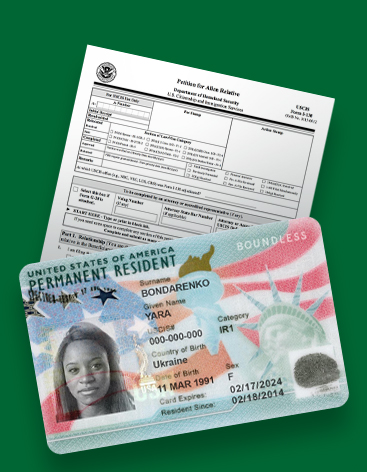MON – FRI (8am - 6pm)
The T Visa is a nonimmigrant status in the United States designed to protect victims of human trafficking. This visa allows victims to remain in the country for up to four years, giving them the opportunity to stabilize their lives while cooperating with authorities in the investigation.
The T Visa not only provides a safe haven but also allows victims to access services and benefits as the eventual transition to Green Card. For legal guidance on the process of transitioning from T Visa to Green Card, contact Serving Immigrants.


Transitioning from a T Visa to Green Card is a crucial step for individuals who have experienced human trafficking. While the T Visa offers temporary protection and work authorization, moving to permanent residency through a Green Card provides long-term stability.
A Green Card allows individuals to live and work in the United States indefinitely, offering more security and the opportunity to eventually apply for U.S. citizenship.
Moreover, with permanent residency, Green Card holders gain access to additional benefits such as the ability to sponsor family members for visas, improved job opportunities, and eligibility for certain federal assistance programs. The process of transitioning from a T Visa to a Green Card not only enhances personal and financial security but also paves the way for a more stable future.
The T Visa has an initial validity period of four years. During this time, beneficiaries can live and work in the United States legally. However, it is important to note that at the end of this period, T Visa holders must either apply for an extension or begin the process to obtain permanent residence. In certain circumstances, such as the continuation of a criminal investigation a visa extension can be requested.
As the expiration of the T Visa approaches, holders have several options to continue legally residing in the United States. One option is to apply for permanent residence, another option is to request an extension of the T Visa if there is a valid reason, such as the need to cooperate in an ongoing investigation. For the transiton from T visa to Green card, it is important to have the legal guidance of an expert attorney in immigration.
Exploring the essential considerations related to work authorization and international travel for T visa holders.
Before making the transition from t visa to green card, T Visa holders have an authorization to work in the U.S., allowing them to obtain a Social Security number and access legal employment. Although Employment Authorization Document (EAD) is not required, many choose to apply for one to facilitate administrative and employment processes.
T Visa grants many benefits, traveling outside the U.S. can be complicated for holders of this visa. It is essential to obtain "advance parole" before leaving the country.
Returning without a permission could result in the loss of the T Visa and other legal issues. Additionally, there is a "continuous physical presence" requirement for those seeking to adjust their status to permanent resident.

T Visa holders can petition family members, like spouses, children, and parents. Family members don't need to be trafficking victims themselves, lasting only as long as the T Visa holder's status. The T Visa allows family members to live and work in the U.S. Without transitioning from T Visa to Green Card, their status may lapse.
Once the transition from T Visa to Green Card is done, family reunification options expand significantly. Green Card holders can petition for their immediate family members—spouses and unmarried children under 21—to join them in the U.S. as lawful permanent residents.
Moreover, family members can eventually apply for their own Green Cards, opening the path to U.S. citizenship. This transition also allows more flexibility for future family reunification petitions. If you want to read more about the Green Card for relatives in the U.S., learn more here.

Learn about the key requirements that T Visa holders must meet to adjust their status from T Visa to Green Card and obtain permanent residency in the U.S.
The T Visa holder must have continuously resided in the U.S. for at least three years from the time the visa was granted or until the investigation or prosecution of the trafficking case has been completed.
During their stay in the U.S., the T Visa holder must have maintained good moral character. This means not having committed any criminal acts or behaviors that could disqualify them from permanent residency.
The applicant must have cooperated with authorities in the investigation or prosecution of human trafficking. This cooperation is a key requirement unless the applicant is granted a waiver due to age, trauma, or if it would be harmful to the individual's health.
The applicant must demonstrate that they are not inadmissible to the U.S. This means they should not have any legal barriers, such as serious criminal records, that would prevent them from adjusting their status to permanent resident.
To begin the process of obtaining a Green Card, the T Visa holder must file Form I-485. This form must be accompanied by the necessary documentation that supports their eligibility, such as proof of continuous residence, good moral character, and cooperation with authorities.See how Form I-485 looks.
The transition from T Visa to Green Card provides significant benefits beyond temporary protection. While the T Visa allows victims of human trafficking to remain in the U.S. and work legally, it is a temporary solution, typically lasting up to four years. A Green Card, however, offers permanent residency, allowing holders to stay in the U.S. indefinitely.
One key difference is the stability that comes with a Green Card. T Visa holders must regularly renew their work permits, but Green Card holders do not face this uncertainty. Additionally, Green Card holders have access to more employment opportunities and can pursue careers that require permanent residency status.
Explore essential information and key details related to the transition from T Visa to Green Card in our frequently asked questions:
Traveling outside the U.S. with a T Visa can be complicated. You must obtain advance parole to return without losing your status. If you want to read about advance parol click here.
The immigration interview is a part of the process where USCIS reviews your application and asks you questions to verify your eligibility for permanent residency.
If you do not renew your T Visa on time, you could lose your legal status, which could complicate or prevent the approval of your Green Card application.
The processing time to obtain a Green Card can vary, but it generally takes between 12 and 36 months after submitting the application.